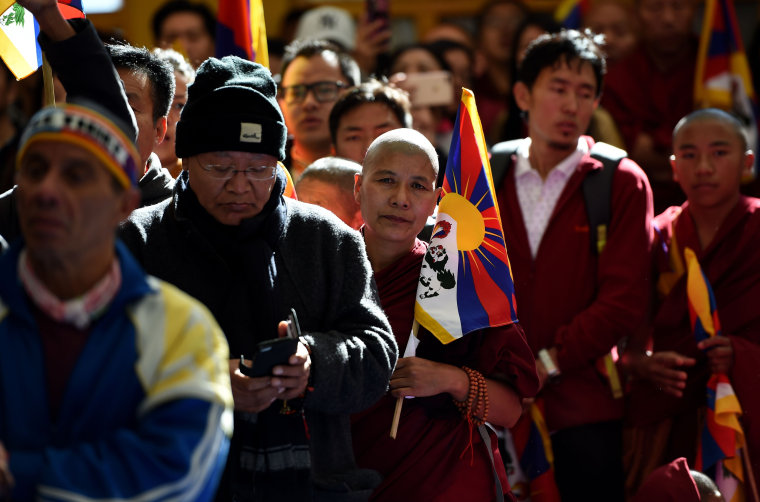BEIJING — China is defending its often-criticized rule in Tibet 60 years after the Dalai Lama fled into exile amid an uprising against Chinese control, saying those who question its policies are merely biased.
The official Xinhua News Agency said in an editorial dated Saturday that economic growth, increases in lifespan and better education in the region refute the claims of critics.
Tibet is ruled under a smothering Chinese security blanket and many Tibetans abroad say the Himalayan region’s resources are being exploited for Beijing’s benefit while Tibet’s language and unique Buddhist culture is gradually being destroyed.
The Dalai Lama has been living in the northern Indian town of Dharmsala since he fled from Tibet after a failed 1959 uprising against Chinese rule. Beijing accuses him of seeking to separate Tibet from China, which he denies.
At least 3,000 Tibetans marched through the center of India’s capital on Sunday. Invoking India's concerns over China's expansive power in Asia and beyond, the marchers shouted slogans including "Tibet's freedom is India's security" and "India-China friendship is a sham."
China claims Tibet has been part of its territory for centuries, although many Tibetans say they were essentially independent for most of that time. Communist troops took control of the region in 1950 after a brief military struggle.
Conditions in the region are difficult to independently ascertain because foreign travelers must get special permission to enter the region. Access is rarely given to foreign journalists, and the region is closed to foreigners entirely during sensitive anniversaries.
The Xinhua editorial did not directly mention Sunday’s uprising anniversary, referring to the events of 1959 instead as the inauguration of “democratic reform” that saw the dismantlement of the Buddhist hierarchy and feudal structures.
“Sixty years since the epoch-making democratic reform in Tibet, people in the plateau region have enjoyed unprecedented human rights in history,” Xinhua said.
“Undeniable facts and figures” related to development “debunk the repeated lies and accusations that aim to smear Tibet’s human rights with vile motives,” it said. “Anyone without bias will recognize Tibet’s tremendous progress in human rights.”
Among the figures it cited were a rise in life expectancy of 35.5 years in the 1950s to nearly 70 now; a double-digit growth in regional GDP over the last quarter-century; and reduction of poverty by 80 percent.
Citing cases of torture and forced political indoctrination, a coalition of dozens of overseas Tibet monitoring groups said the issue of human rights in Tibet “remains an issue that cannot be consigned to history.”
“China has ridden roughshod over the human and political rights of citizens under its rule for far too long,” the International Tibet Network said in a letter emailed to media. “With resistance by the Tibetan people so strong and vibrant, it’s time for a response from the international community that matches their courage and conviction.”
China has refused to meet with the Dalai Lama, the region’s traditional Buddhist leader, who lives in India, or his representatives until they surrender their conditions for a greater degree of autonomy and submit to Beijing’s authority unequivocally.
On Wednesday, China’s Communist Party chief in Tibet insisted that the Tibetan people feel more affection toward the government than to the Dalai Lama, who fled following the abortive uprising against Chinese.
The Dalai Lama hasn’t done a “single good thing” for Tibet since he left, Tibet Party Secretary Wu Yingjie said during a meeting of China’s ceremonial legislature.
Chinese rule in Tibet has grown harsher since anti-government protests in 2008 culminated in attacks on businesses and individuals of Han Chinese ethnicity, the country’s ethnic majority.
The government says rioters killed 18 people. An unknown number of Tibetans were killed by security forces in the aftermath.
More recently, traditionally Tibetan regions of western China have been racked by a series of self-immolations by Buddhist clergy and lay people calling for the return of the Dalai Lama, now 83 years old.

